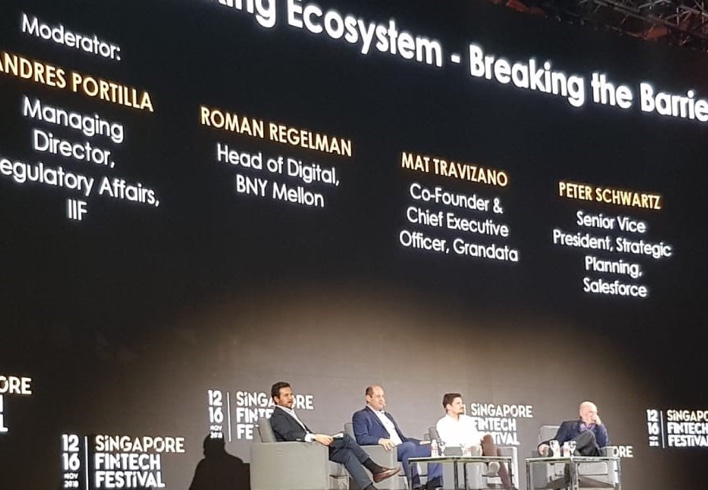On Tuesday, Roman Regelman, BNY Mellon Head of Digital, joined Mat Travizano, Co-Founder and CEO of Grandata and Peter Schwartz, Chief Future Officer, Salesforce in a leadership panel at this year’s Singapore FinTech Festival to discuss and debate ways to reimagine banking ecosystem and breaking the data barrier in financial institutions. Andres Portilla of the Institute of International Finance, moderated the discussion.

The Singapore FinTech Festival is a highly anticipated annual event that attracts luminaries from many corridors, including bankers, investors, technologists, senior government officials, and other key fintech stakeholders and influencers. More than 40,000 attendees were expected to participate in this year’s event.
The Singapore FinTech Festival is a highly anticipated annual event that attracts luminaries from many corridors, including bankers, investors, technologists, senior government officials, and other key fintech stakeholders and influencers. More than 40,000 attendees were expected to participate in this year’s event.
Data is the new oil
The value of abundant data provoked a great deal of discussion by the panel. They shared their views on how the rich world of data allows banks to understand, analyze and create a holistic view of their clients. With this, banks can move from a specific customer lens to a broader ecosystem lens where banks can pull into focus a comprehensive picture of clients and their activities, and how they act within broad operating environments.
To build a comprehensive view requires data from many global sources. It isn't one single source of data; it is from the bank, but it’s also healthcare data, telecommunications data, and data from weather and traffic sources. It follows then if data is the new oil, that the banks which organize and integrate the data to the biggest benefit of clients will be the institutions that will reap the greatest value.
Regelman noted that with BNY Mellon being 234 years old, it has been through multiple cycles of innovation. Responding to the question on where the value of data lies, Regelman said, “Is the value in the front end, or is the value in distribution systems? The front end is easier, we all know that. The distribution system is harder. That's what data does—it links the front end with the end-to-end distribution system, and that's where the service comes in. Adding, “Fundamentally for us, the digital and physical interactions go together in the way we provide service for clients and the way we support the financial system around the world.”
The currency of trust
The conversation soon flowed to the importance of trust. The panel commented that money is based on trust. The whole financial system was built on this trust. New technologies, like blockchain, can instead help produce trust from the underlying mathematical and theoretical systems to become a fundamental component in client ecosystems. It allows banks to develop different ways to deliver trust to different clients.

Panelists shared the view that banks’ clients expect transparency and the ability to inspect the data and algorithms. Banks would benefit by making their clients comfortable with data and algorithms. Regelman added, “Clients want tailored services, but they will only accept them if there is trust. If they trust the providers of services and the organizers of data, they will feel like they have control themselves.”
Moving from money management to data management
People trust banks with their money. Similarly, they need to trust banks with their data. “Institutions have a dilemma,” said Regelman. “Some have more data than trust. Others have more trust than data. The winners will be those institutions that possess superior data and engender absolute trust.”
Adding, “I think the trick here is to use the world's data but make that your own. Our clients ultimately want to embrace a scenario where the world's data comes to them,” said Regelman. “Technology allows banks to create unique insights for each individual client. There is no client that has a single provider for everything, so we work with them in creating a value chain of different providers. Somebody will provide data, somebody will provide the algorithm, and somebody provides robots or humans, which ultimately, works on behalf of the client.”
Regelman concluded, “There's a lot of talk around physical versus digital, cloud versus fixed, local versus global, regulated versus open. But these are false dichotomies. You have to have both physical and digital. You have to be global, and you have to be local. You have to offer clients complete security, and the ability to see the data and algorithm. Ultimately, it’s all of this, intertwined.”
Media Contact:
Frank Pinto
+1 917 309 1065
frank.pinto@bnymellon.com